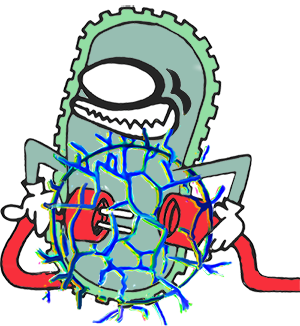Team:TU Delft-Leiden/Project/Life science/EET/cloning/GoldenGate
From 2014.igem.org
| Line 8: | Line 8: | ||
<h2> Extracellular Electron Transport Module - Cloning - Golden Gate Assembly</h2> | <h2> Extracellular Electron Transport Module - Cloning - Golden Gate Assembly</h2> | ||
<p> | <p> | ||
| - | Making a BioBrick of the <i>mtrCAB</i> operon is quite challenging. First of all, the coding sequence of <i>mtrCAB</i> contains several illegal restrictions sites. Secondly, we need to have the operon under the regulation of an adjusted T7 lac promoter, which was found to be the best promoter to express <i>mtrCAB</i> in <i> E. coli </i> [1]. To get rid of the illegal restriction sites as well as implementing the adjusted T7 lac promoter in our BioBrick, we ended up having 5 pieces of DNA to be ligated into pSB1C3. To work efficiently, we used the LINK Golden Gate Assembly to clone | + | Making a BioBrick of the <i>mtrCAB</i> operon is quite challenging. First of all, the coding sequence of <i>mtrCAB</i> contains several illegal restrictions sites. Secondly, we need to have the operon under the regulation of an adjusted T7 lac promoter, which was found to be the best promoter to express <i>mtrCAB</i> in <i> E. coli </i> [1]. To get rid of the illegal restriction sites as well as implementing the adjusted T7 lac promoter in our BioBrick <a href="http://parts.igem.org/Part:BBa_K1316012">BBa_K1316012 </a> , we ended up having 5 pieces of DNA to be ligated into pSB1C3. To work efficiently, we used the LINK Golden Gate Assembly to clone <a href="http://parts.igem.org/Part:BBa_K1316012">BBa_K1316012 </a> (see figure 1). |
</p> | </p> | ||
| Line 14: | Line 14: | ||
<center><img style="margin-left: -10%;" src="https://static.igem.org/mediawiki/2014/archive/8/86/20141011133410%21TUDELFT2014_goldengateET.PNG" width="120%"></center> | <center><img style="margin-left: -10%;" src="https://static.igem.org/mediawiki/2014/archive/8/86/20141011133410%21TUDELFT2014_goldengateET.PNG" width="120%"></center> | ||
<figcaption> | <figcaption> | ||
| - | Figure 1. <b>Golden Gate Assembly of the <i>mtrCAB</i> operon.</b> The BioBrick encodes an adjusted T7 lac promoter (red rectangle) and the coding sequences of <i>mtrC</i>, <i>mtrA</i> and <i>mtrB</i>, indicated with grey arrows. The beam beneath the arrows visualizes the regions and relative sizes of the 5 DNA pieces that were ligated into pSB1C3. | + | Figure 1. <b>Golden Gate Assembly of the <i>mtrCAB</i> operon.</b> The BioBrick <a href="http://parts.igem.org/Part:BBa_K1316012">BBa_K1316012 </a> encodes an adjusted T7 lac promoter (red rectangle) and the coding sequences of <i>mtrC</i>, <i>mtrA</i> and <i>mtrB</i>, indicated with grey arrows. The beam beneath the arrows visualizes the regions and relative sizes of the 5 DNA pieces that were ligated into pSB1C3. |
</figcaption> | </figcaption> | ||
Latest revision as of 11:18, 12 October 2014
Extracellular Electron Transport Module - Cloning - Golden Gate Assembly
Making a BioBrick of the mtrCAB operon is quite challenging. First of all, the coding sequence of mtrCAB contains several illegal restrictions sites. Secondly, we need to have the operon under the regulation of an adjusted T7 lac promoter, which was found to be the best promoter to express mtrCAB in E. coli [1]. To get rid of the illegal restriction sites as well as implementing the adjusted T7 lac promoter in our BioBrick BBa_K1316012 , we ended up having 5 pieces of DNA to be ligated into pSB1C3. To work efficiently, we used the LINK Golden Gate Assembly to clone BBa_K1316012 (see figure 1).

References
1. C.P. Goldbeck et al., Tuning promoter strengths for improved synthesis and function of electron conduits in E. coli. ACS Synth. Biol. 2 (3), pp 150–159 (2013)
 "
"






